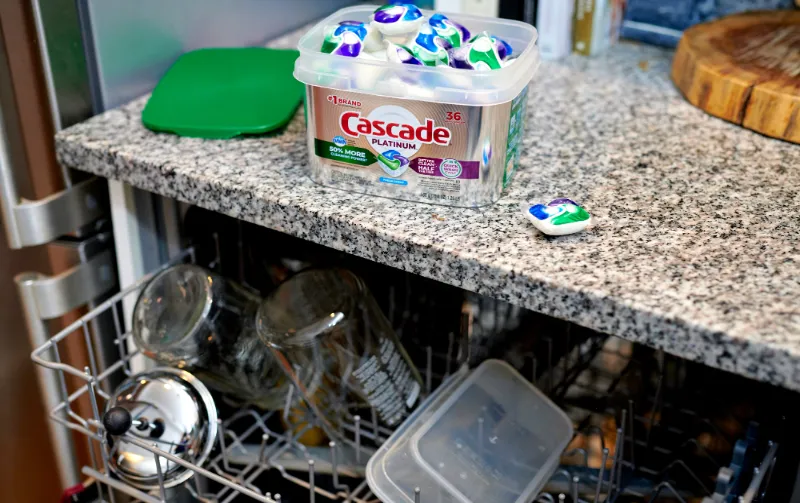Cascade pods are generally safe for dishwashers when used as directed. Misuse or overuse can potentially lead to issues such as clogging or excessive suds.
Dishwasher pods like those offered by Cascade have revolutionized kitchen clean-ups, offering a convenient premeasured dose of detergent for sparkling results.
Busy homeowners prize them for their efficiency and effectiveness.
Nevertheless, it’s crucial to use them correctly to prevent any harm to your dishwasher.
Overloading the machine or popping in extra pods could backfire, creating mechanical problems or leaving a soapy residue on your dishes.
To ensure your dishwasher remains in top condition, always follow the manufacturer’s instructions on pod usage.
Embracing their simplicity without compromising on care will keep both your dishes and your dishwasher in excellent shape.

Types Of Dishwasher Detergents
Liquid detergents are known for their convenience and relatively low cost.
A measured amount flows smoothly into the dispenser and is especially effective on greasy stains.
Yet, its viscous nature may lead to a need for frequent cleanup of residual build-up.
Powder detergents offer a traditional cleaning solution and are often economically priced.
Their granules allow for customizable doses—ideal for very soiled dishes or hard water conditions.
However, they must be kept dry, as moisture causes clumping.
Lastly, Pods or packets are the epitome of convenience with pre-measured detergent, combining liquid and powder’s best properties.
Concerns arise about their compatibility and potential long-term effects on dishwasher components due to their high concentration.
| Type | Pros | Cons |
|---|---|---|
| Liquid | Easy to use, works on grease | May leave residue |
| Powder | Cost-effective, customizable dose | Clumps in moisture |
| Pods | Convenient, pre-measured | Potentially harsh |
The Science Behind Cascade Pods
Cascade Pods typically contain a blend of enzymes and detergents designed to break down food particles and remove stains.
The concentration of these active ingredients is formulated to be efficient in small doses, ensuring that each pod packs a powerful cleaning punch.
Nevertheless, the very components that make them effective could also be a concern regarding their compatibility with certain dishwasher models.
Dishwasher safety is a paramount consideration for manufacturers, and most Cascade Pods are deemed safe for the majority of dishwasher brands.
Users should always consult their dishwasher’s manual to confirm its suitability with detergent pods.
It’s important to note that excessive use or improper storage of Cascade Pods might lead to buildup in the dishwasher’s internal components, potentially affecting its performance over time.
While there isn’t a one-size-fits-all answer, users can ensure optimal dishwasher health by adhering to usage instructions and routine maintenance.
This helps maintain the longevity and efficiency of both the dishwasher and the pods themselves.
Frequently Asked Questions For Are Cascade Pods Bad For Your Dishwasher
Do Cascade Pods Damage Dishwashers?
Cascade Pods are designed to be safe for use in all mainstream dishwashers when used as directed.
What Ingredients In Cascade Pods Affect Dishwashers?
Certain ingredients in dishwasher pods, including Cascade, such as nonylphenol ethoxylates, may contribute to wear or residue if not rinsed thoroughly by the dishwasher.
How Often Should Cascade Pods Be Used?
It’s best to use Cascade Pods for each dishwashing cycle as recommended by the product instructions to ensure cleanliness without causing damage from overuse.
Can Cascade Pods Leave Residue In Dishwashers?
If used properly, Cascade Pods should not leave residue. Ensuring the dishwasher is loaded correctly and functioning well helps prevent residue buildup.
Conclusion
Concluding our exploration of Cascade pods and dishwashers, a clear takeaway emerges. Proper usage is key.
Strive for moderation and follow manufacturer guidelines. Trust in quality products to safeguard your appliance.
Remember, informed choices lead to longevity in both dishwashers and satisfaction with cleanliness.
